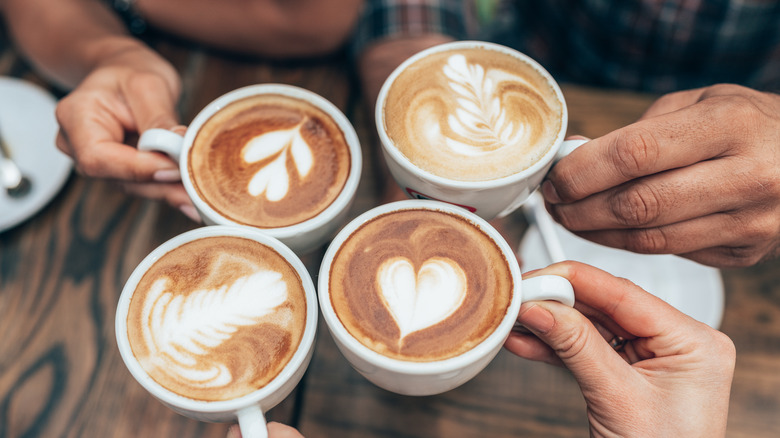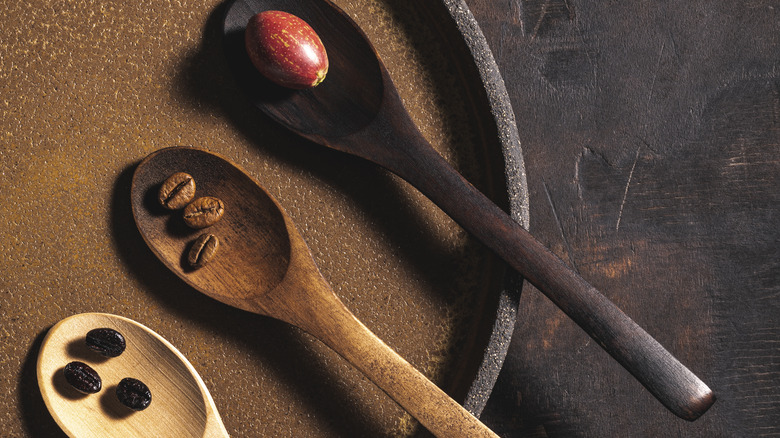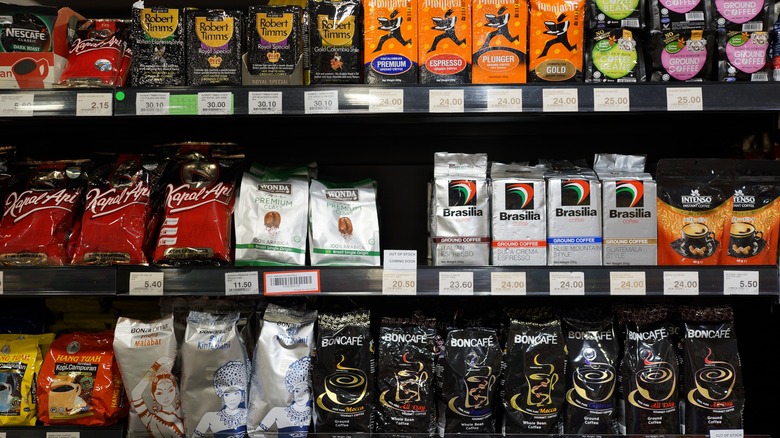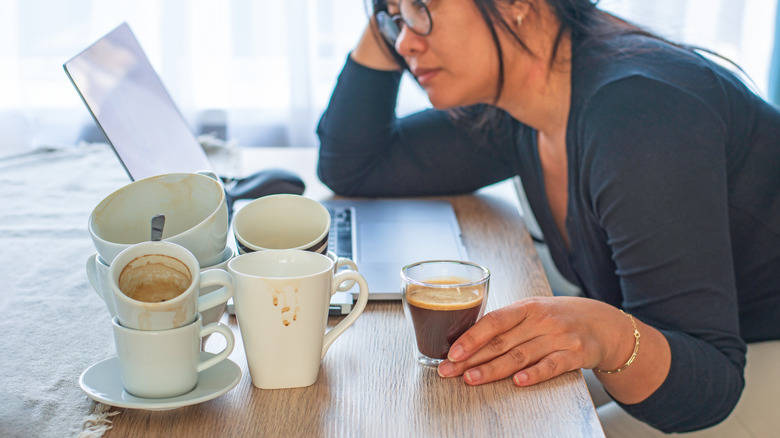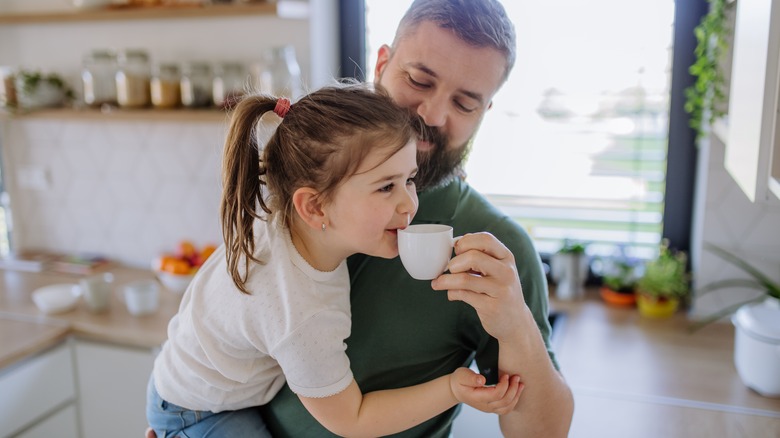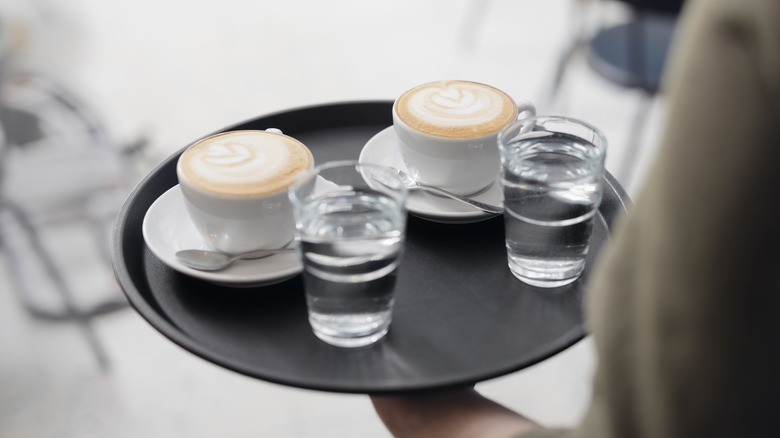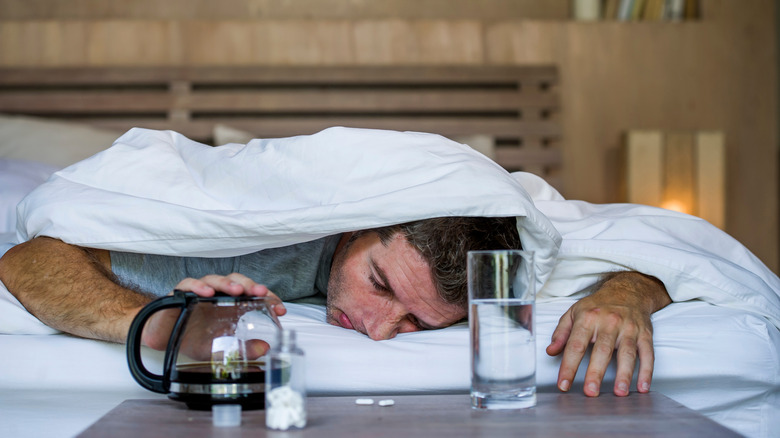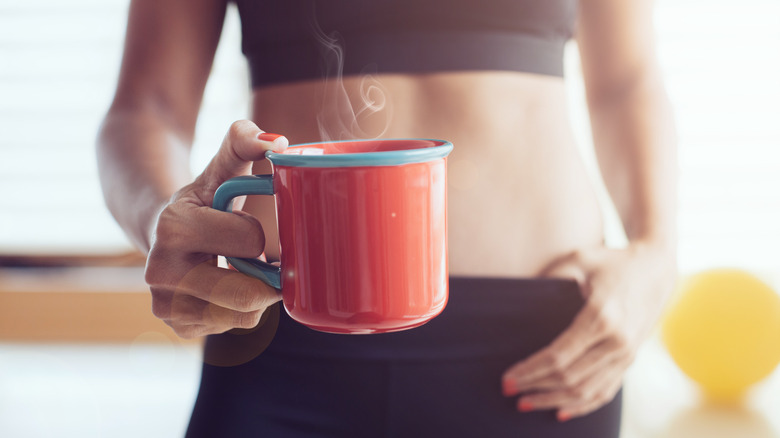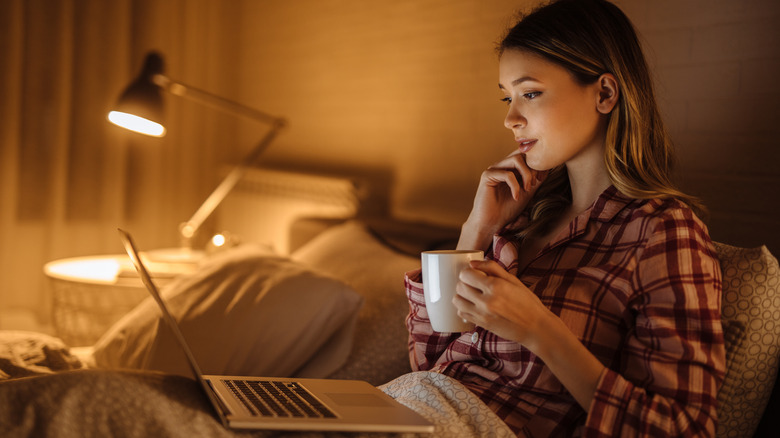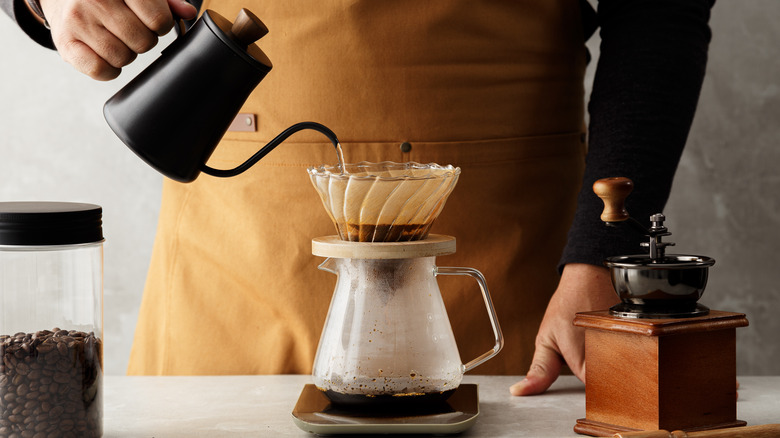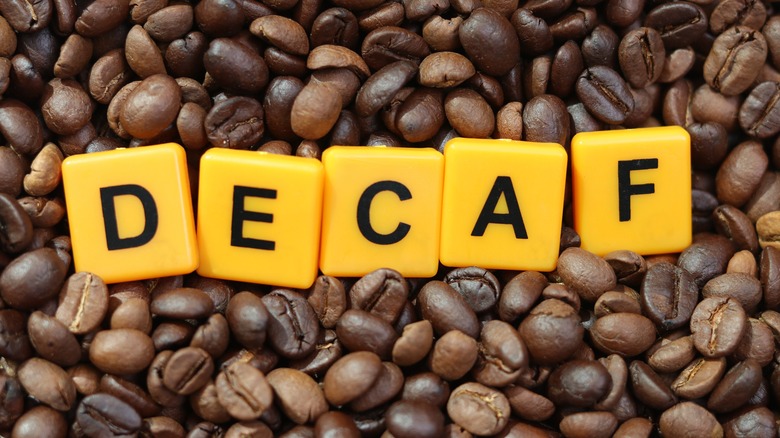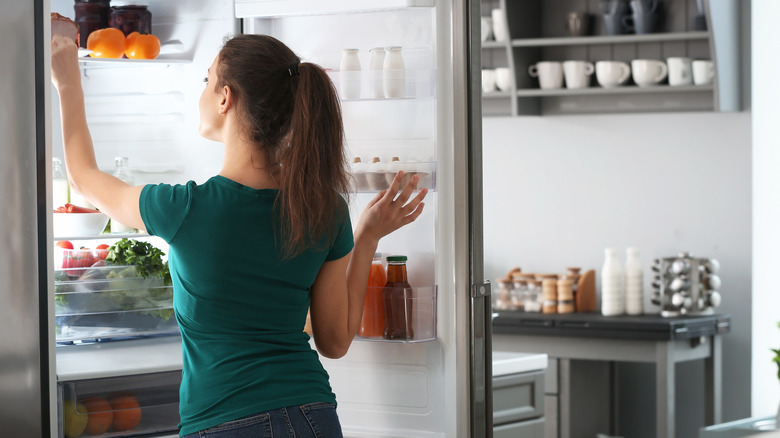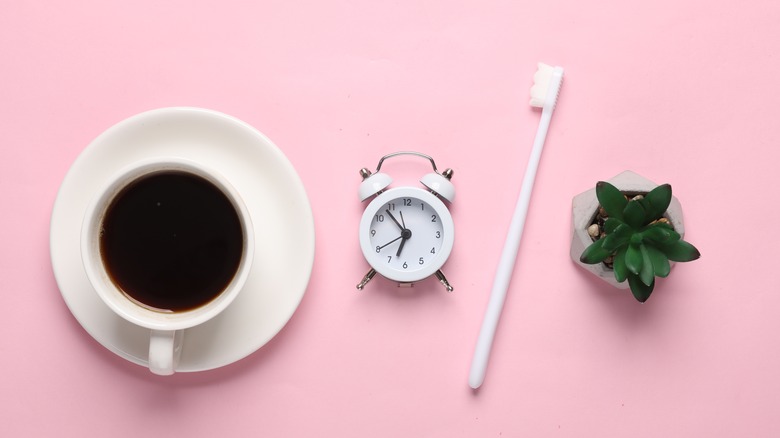12 Longstanding Myths About Coffee, Debunked
When you roll out of bed each morning, there's a good chance you're going to reach for a cup of joe soon after. Whether you use coffee pods, a traditional drip coffee machine, or take a trip through the drive-thru line, consuming coffee is an important daily ritual for around 79% of Americans, according to Statista. While the majority of people in the U.S. consume coffee every day, they often don't actually know very much about it.
While there are an overwhelming amount of coffee lovers, there are also quite a few coffee haters out there who will warn you of its negative side effects. Over the years, both coffee haters and coffee lovers alike have come up with some rather interesting myths about the drink. So, we've rounded up some of the most common, untrue coffee myths for you so that you can know the facts before diving into your next morning cup.
Myth: A darker roast means more caffeine
Because darker roasts are known for having a stronger taste than their lighter roast counterparts, many people often think the "strength" of the taste corresponds with the "strength" of the caffeine. Ironically, if anything, the reverse tends to be true, and lighter roasts tend to have slightly more caffeine per serving than dark roasts. However, the difference in caffeine levels between roast levels is usually pretty negligible, especially when the caffeine content is measured based on the weight of the beans rather than by volume.
Because dark roast beans are roasted for longer, they tend to puff up from the heat and take up more volume per bean than their lighter roast counterparts. Therefore, fewer dark roast beans than light roast beans can fit in a given container, which leads the container of dark roast beans to contain less caffeine. However, when dark and light roast coffee are measured by weight, their caffeine levels are actually very similar. So, it's probably best to choose your roast based on what tastes best to you, rather than on ideas about which has more caffeine.
Myth: All coffees have the same amount of caffeine
You may think that buying a bag or a cup of "house blend" or "Italian roast" coffee from any brand or shop will mean you receive coffee that is pretty much the same in terms of caffeine content. However, depending on what brand of coffee you buy or what coffee shop you frequent, you could be getting more or less caffeine than your fellow consumers, even when you buy the same roast level or type of coffee. For example, at Dunkin' Donuts, a single shot of espresso contains 118 mg of caffeine, while at Starbucks, a single shot of espresso only contains 75 mg of caffeine.
There are many things that can cause differences in caffeine levels between various brands or blends of coffee. However, one of the main factors in a coffee's caffeine level can be traced back to the very start of production: Which type of coffee plant did the coffee come from? There are two main types of coffee plants: coffea arabica, commonly referred to as arabica, and coffea canephora, commonly known as robusta. Robusta coffee can actually have about twice as much caffeine as arabica. So, the next time you're trying to determine which coffee has the most caffeine to keep you going, look for the word "robusta" somewhere on the packaging over the word "arabica."
Myth: Coffee is highly addictive
Listen — we're not saying that you won't notice if you skip your morning cup or that coffee cravings aren't real. They definitely are! All coffee contains at least some caffeine, which the human body can become used to consuming and therefore crave. However, human interaction with caffeine is actually classified as a dependence, not an addiction, per information from the Cleveland Clinic. This is a much less serious form of reliance on a given substance than a true addiction. This is because the level to which caffeine raises your dopamine is very low when compared to other illegal and highly addictive stimulants.
Yes, your body will become used to you having caffeine if you consume it often, and you will likely experience withdrawal symptoms such as headaches, tiredness, and difficulty concentrating if you stop consumption suddenly. However, your body should be able to readjust fairly quickly and your symptoms should subside within two to nine days. That being said, it is recommended that you slowly taper off caffeine by replacing fully caffeinated drinks with decaf drinks one at a time until your consumption levels are extremely low.
Myth: Coffee stunts your growth
This is a very common myth that is usually used to discourage young children from drinking coffee. The good news is that it is completely untrue. Your height is almost entirely determined by your genetics, as well as good nutrition, says Johns Hopkins All Children's Hospital. Coffee consumption, even from a young age, will not negatively impact your growth. However, that does not mean that consuming coffee at a young age is healthy, or that it is even without consequence. Coffee contains caffeine, which can have negative effects on anyone — adult or child — depending on how much is consumed and how often.
In a separate publication, Johns Hopkins All Children's states that while the U.S. has no official guidelines regarding caffeine consumption for children, most doctors recommend against any caffeine for children ages 12 and under. Canadian guidelines recommend limiting caffeine consumption to very small amounts for that age range, generally no more than half a cup to one cup of coffee per day maximum, depending on the child's age. Children can experience all the same symptoms from over-consuming coffee that adults can, such as increased heart rate, anxiety, and acid reflux, but because their bodies are smaller, a much smaller amount of caffeine can feel like "too much" for them. So, while allowing your child to have coffee will not affect their growth, it can cause other health issues, especially if it is consumed often or they consume more than one cup in a day.
Myth: Coffee dehydrates you
The common misconception that coffee dehydrates you comes from the fact that coffee contains caffeine, which is a diuretic. When something is a diuretic, it causes you to urinate more, which means your body loses water, per information from GoodRX. However, caffeine is a very mild diuretic, so it does not increase urination to the point of causing dehydration as long as it is consumed in moderate amounts. For most adults, consuming up to 400 mg of caffeine per day will not cause any issues with dehydration.
While it may seem a bit silly to point out, it is also important to remember that coffee is made with water. Therefore, when you consume it, your body is absolutely absorbing some of that water. So, drinking coffee may actually hydrate you slightly. Additionally, if you have coffee on a daily basis, that means your body has adjusted to it and the diuretic effects will be even less for you. If you drink a moderate amount of coffee in a day, especially if you are used to doing so routinely, you have nothing to worry about when it comes to dehydration as a byproduct of coffee consumption.
Myth: Drinking coffee can sober you up
If you've ever had a few too many drinks and been in search of a way to counteract their effects, you may have heard this myth. At face value, it may seem logical. Alcohol is known to make you sleepy, while coffee is known to help you wake up. While both of those things may be true, coffee cannot actually sober you up, even if you feel like it does. Consuming coffee after alcohol can mask some of the effects of the alcohol by making you feel more alert. However, it does not actually reduce the amount of alcohol in a person's system, therefore still making them not sober.
When coffee is used as an attempt to help someone "sober up," dietician Nicole Sohayegh explained to VinePair that it can give that person the false impression that they are capable of performing activities (such as driving) that are still very dangerous with alcohol in their system. Just because you followed up your drinks with some coffee does not mean it is safe to do things that you would otherwise not do after a few drinks, even if you feel "alert enough." The best way to help your body recover from the effects of alcohol is to stay hydrated and give your body time to process and get rid of the alcohol naturally.
Myth: Coffee helps weight loss
The myth that coffee assists in weight loss can be true to an extent, but only under certain conditions. People sometimes assume when they hear this myth that if they drink a bunch of coffee, then they will automatically lose weight. However, that is definitely not the case. The myth stems from two key facts: First, that coffee can suppress your appetite, and second, that it can boost your metabolism. While both of those statements are true, per Live Science, in terms of leading to noticeable weight loss, they are only a small part of the bigger picture. There are many other elements of your lifestyle that you must be mindful of in conjunction with your coffee intake in order for weight loss to occur.
The amount of appetite suppression and metabolism boost that occurs when you drink coffee can easily be counteracted by other unhealthy behaviors. A large part of this is related to what you put in your coffee. While black coffee has no calories and can give you the great benefits mentioned here, many people do not enjoy the taste. So, if you start drinking more coffee but load it up with sweeteners, flavor syrups, and cream every the time, the extra calories and fat from those additives will make it almost impossible for you to lose weight. Coffee with little or no additives should be combined with a healthy diet and routine exercise for the best weight loss results.
Myth: Coffee causes insomnia
The myth that coffee causes insomnia likely stems from the simple truth that coffee contains caffeine, which is a stimulant. And yes, stimulants can keep you awake. However, when people hear this, many automatically think that if they are having trouble sleeping, they should completely quit drinking coffee and all other caffeinated drinks. In actuality, like any stimulant, or really any drug, caffeine only stays in your system for a certain amount of time.
For caffeine, the amount of time it takes to fully move through your system can be up to about 10 hours (via Healthline). Most medical professionals advise that it's best to stop consuming caffeine about six hours before your desired bedtime. So, if you go to bed around 10 p.m., as long as you don't consume caffeine after 4 p.m., it's unlikely that you will experience any negative side effects come bedtime. If you really want to play it safe, you can stop around noon. Oftentimes, people who are not aware of caffeine's 10-hour processing timeframe will start to blame their morning coffee for their sleep struggles. If that is the case for you, it's likely that the true culprits of your insomnia are other environmental stressors at bedtime.
Myth: You should use boiling water to make coffee
There are many different machines you can use to make coffee with ease at home, but making truly delicious coffee on your own can be something of an art form. One popular way to take more control over the settings of your perfect brew is to use the pour-over method. This involves using freshly ground coffee, a pour-over apparatus with a coffee filter inside, and a carafe to catch the coffee at the bottom. Once your carafe is set up with the pour-over apparatus, the filter, and your freshly ground coffee, you slowly pour hot water over the grounds, which drips through the filter and collects in the carafe.
If you are not an experienced pour-over enthusiast and have only used coffee machines that automatically determine the coffee temperature as you brew, you may not know that the hot water used to make coffee actually isn't boiling. The ideal temperature for water used to make coffee is actually between 195 and 205 degrees Fahrenheit. Water that is at 212 degrees Fahrenheit can actually scald the coffee, leading to a burnt taste. If you don't have a way of measuring your water temperature for the pour-over method, a useful trick is to wait for the water to boil, then remove it from the heat and wait 30 seconds before using it to brew.
Myth: Decaf coffee has no caffeine
When people seek out decaf coffee, it is often because they are trying to reduce or eliminate their caffeine consumption. Common reasons include heart issues, sensitivities, pregnancy, and other health-related factors. While slowly tapering off your caffeine intake by replacing regular cups of coffee with decaf can be a great way to work towards a goal of quitting caffeine, drinking only decaf coffee does not mean your caffeine intake is 0 mg. Some people may incorrectly believe that decaf coffee is its own plant or product and that there is never any caffeine in the bean at all. In actuality, decaf coffee is made from the same beans as regular coffee, and the caffeine is washed away in a special process. But, the process is not 100% perfect, so a small amount of caffeine is always left behind in the beans.
The process of removing caffeine from the beans involves them being warmed and soaked in liquid in one of the following ways: using just water, using a mixture of water and solvents that are applied directly or indirectly, or using water and supercritical carbon dioxide. These processes can remove about 97% of the caffeine present in the beans. The end result is a typical cup of decaf coffee, which has about 2 mg of caffeine. In contrast, a typical cup of regular coffee has about 95 mg of caffeine.
Myth: Storing coffee in the fridge or freezer always keeps it fresh
It's no secret that coffee is supposed to be a shelf-stable pantry item — after all, that's how it's sold in the grocery store! But, some coffee enthusiasts have been known to keep their coffee beans in the fridge or freezer under the guise of preserving them better. Does this really give the beans more longevity? Well, not exactly.
When you keep your coffee beans in the fridge or freezer, what you are really preserving with the cold is the smell. The actual freshness of the beans, however, will remain unaffected. If you love the glorious aroma of opening up those fresh beans, then continue storing them in the fridge or freezer. But, be very careful that you are storing them correctly. If your coffee beans are not stored in an airtight container when you put them in the fridge or freezer, they can absorb moisture, which will actually make your coffee beans go stale quicker.
Myth: You should brush your teeth right after drinking coffee
As you get ready each day, drinking coffee and brushing your teeth are probably both very important parts of your morning routine. But, you may want to rethink your morning timeline for better dental hygiene. No one wants to be stuck with coffee breath at work. Therefore, it seems perfectly logical to drink your coffee first, then brush your teeth and go about your day with fresh breath. However, brushing your teeth too soon after drinking coffee can actually cause damage to your teeth.
When you drink coffee, you are consuming an acidic beverage. The acidic nature of coffee means that it can weaken your tooth enamel. Brushing immediately after you drink your coffee can further damage this enamel. Instead, it's best to wait 30 to 60 minutes after you drink your coffee to start brushing your teeth. Alternatively, you can brush your teeth before you drink your coffee, which can help you maintain a whiter smile by brushing away plaque so that the coffee can't stick to it.

